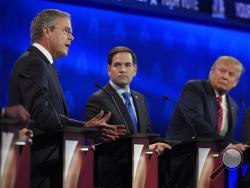WASHINGTON (AP) — Jeb Bush sought to calm anxious donors with a comeback strategy focused on taking down rival Marco Rubio. But Bush's plan backfired badly on national television in the third GOP presidential debate.
Instead of generating much needed momentum, Bush's attack on his onetime protege raised new questions about his underwhelming candidacy in the primary contest he was once expected to dominate. And Bush's continued struggles highlight a deepening sense of uncertainty settling over a 2016 Republican presidential race that remains crowded and without a clear front-runner.
Even with an estimated $100 million in the bank, Bush headed into Wednesday's primetime debate at the weakest point of his campaign.
Just five days earlier, the son and brother of former presidents announced deep campaign spending cuts designed to salvage his floundering bid. He slashed salaries by 40 percent and shifted staff from his Miami headquarters to early voting states.
With his powerful family on hand, Bush spent much of the weekend huddling behind closed doors outlining a strategy that depended, above all else, on challenging Rubio. Bush appeared to get the perfect opportunity to test his strategy when he was positioned right next to Rubio on the debate stage.
The mild-mannered Bush mustered up an attack on Rubio for missing so many votes in the Senate. "Marco, when you signed up for this, this was a six-year term, and you should be showing up to work. I mean, literally, the Senate — what is it, like a French work week? You get, like, three days where you have to show up? You can campaign, or just resign and let someone else take the job."
It was the moment Bush's supporters had been waiting for. But so, apparently, was Rubio.
The first-term senator, Bush's junior by 18 years, quickly charged that Bush had praised Arizona Sen. John McCain, who has missed many votes as well.
"I don't remember you ever complaining about John McCain's vote record," Rubio said. "The only reason why you're doing it now is because we're running for the same position, and someone has convinced you that attacking me is going to help you."
The fresh-faced senator then pivoted beautifully: "My campaign is going to be about the future of America, it's not going to be about attacking anyone else on this stage."
The crowd cheered. Bush's team did not.
Ari Fleischer, who worked in the George W. Bush administration, said Bush should have attacked Donald Trump instead of Rubio. "Mistake going after Rubio," Fleischer tweeted.
And Bush never seemed to recover from the exchange, which took place just minutes into the debate.
He almost completely disappeared for long stretches. In fact, Bush had the least speaking time of anyone in the debate, by some counts.
Despite his challenges, there is no sign that Bush is close to abandoning his campaign. An allied super PAC has raised more than $100 million on his behalf.
Yet if Bush World was worried heading into the debate, they will feel no better Thursday morning.
Rubio, who has been showing signs of momentum recently, shined for most of the night. He continues to face questions about his ability to build a national organization and raise the money necessary to support it — a problem Bush does not have. Yet his fundraising should improve coming off a strong performance on national television.
"This is all part of slowly moving up in the process," Rubio's campaign manager, Terry Sullivan, said after the debate. Asked about Bush's performance, Sullivan said, "There's no need to pile on Gov. Bush."
The other candidates had varied performances.
The soft-spoken retired neurosurgeon Ben Carson, who has led recent polls, flashed his personality at times, but struggled to articulate his policies at others. Trump was on the attack early and often, but also was silent for long stretches. And Texas Sen. Ted Cruz earned top marks from the audience and on social media for attacking the media and defending single mothers.
Yet nearly three months before the Iowa caucuses, the race for the 2016 Republican presidential nomination is an unsettled as ever.
Bush's team conceded that Rubio had a strong night.
"No one is going to argue Sen. Rubio is an outstanding performer," said Bush campaign manager Danny Diaz. "But there's a difference between an outstanding performer and someone who has delivered over and over again."
He said Jeb was able to talk about issues, and if he keeps doing that he will win over voters.
Meanwhile, Bush retreats to New Hampshire on Thursday for a two-day campaign swing in a state that increasingly looks like a must-win.
Bush's team circulated talking points shortly before the debate noting he has more paid staff in New Hampshire than any of the four states set to hold primary contests in February. And further increasing expectations, the talking points note that "we are placing a special focus on increasing our New Hampshire operation."
Rubio is scheduled to visit New Hampshire next week.

